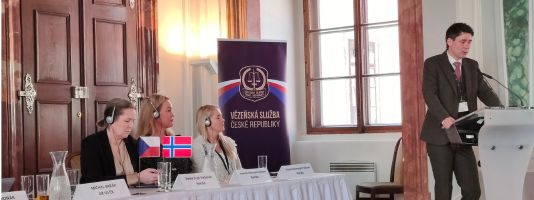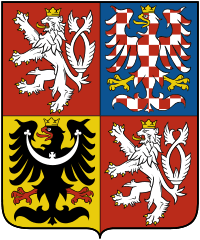Punishment and Help do not contradict each other

Published
PRAGUE 15. april (VS ČR) - Intervention programs for convicts: On April 15, 2024, in the Theresian Hall of the Břevnov Monastery in Prague, in the presence of representatives of the Embassy of the Kingdom of Norway in Prague, the Directorate of the Norwegian Correctional Service, the Ministry of Justice of the Czech Republic, the Ministry of Finance of the Czech Republic, the management of the Prison Service of the Czech Republic, and the prisons involved, guarantors, lecturers, and the professional public, the ceremonial final conference of the project Reducing the Risks of Convicts through Intervention Programs took place.
The final conference of the project presented the individual programs. The contributions included words about the importance of punishment, which changes; about punishment and help, which are not in conflict with each other; about the mutually enriching cooperation between the Norwegian Correctional Service and the Prison Service of the Czech Republic, which has grown into a partnership and friendship over the years.

The implementation of the project with a budget of over 40 million CZK, financed by Norway grants, began in March 2020. The main goal of the project is to improve services for prisoners through programs adopted and localized for Czech conditions (Motivator program, Pappa program) and to introduct completely new programs for drug users (substitution treatment program, protective treatment program, after-treatment program). The project will be completed on April 30, 2024.
For the purposes of piloting individual programs, the premises of the 9 organizational units involved were also aestheticized, modified and fully equipped, totaling 20 million CZK. For example, in Pilsen Prison, unused basement spaces, which were originally in a desolate consition were comprehensively reconstructed. In Rapotice Prison, a building that was originally used by the army as a fuel warehouse was reconstructed for this purpose. The result of the reconstruction is aesthetic and fully functional spaces, prepared for the implementation of therapeutic programs and professional treatment. The guarantors and lecturers of individual programs were trained by Norwegian partners, and the necessary manuals, worksheets, educational brochures and methodologies were also translated and printed.
On the 1st day of the conference, after the opening remarks, the medium-term motivational program Motivator was presented, which focuses on preparing convicts, as well as inmates, with specific criminogenic risks to participate in follow-up therapeutic programs.
In the afternoon of the first day of the conference, the Pappa program was also presented in more detail, which aims to strengthen the rights of the child and the ability of imprisoned fathers to manage and exercise their paternal role. The program, which is based on dialogue, involved 10 trained lecturers and 47 convicts from Bělušice Prison, Horní Slavkov Prison, Pardubice Prison, and Znojmo Prison. The program also included events such as Day with a Child (meetings of families of program participants). At the same time, educational brochures and videos were created for children, families, and imprisoned fathers.
The program of the 2nd day of the conference focused on professional care and programs for drug users. These are three programs for drug users: a unified standard of protective treatment and recommended "evidence-based" procedures for providing protective treatment within specialized sections for the performance of protective treatment (hereinafter referred to as "SPOOL"), including the preparatory phase for the inclusion of a client in SPOOL.
Within the framework of substitution treatment, a psychosocial component of substitution therapy was developed, which complements the pharmacological part of substitution treatment. The after-treatment program, intended for graduates of therapeutic programs of specialized units for drug users, aims to maintain the positive changes that occurred during therapy until release from prison. The programs were piloted in the Opava Prison and Forensic Detention Facility, the Prague Pankrác Remand Prison and Forensic Detention Facility and the Nové Sedlo Prison, and a total of 61 convicts participated in them. As part of the project, methadone dispensers were also purchased for two prisons. The aim of this investment was not only to ensure comfort for the work of medical personnel, common in civilian life, but also to increase the safety of administering this medicinal product.
All programs and their results will now be evaluated, standardized, and expanded to other remand prisons, prisons and forensic detention facilities.
(2).jpg)
Text: Czech Prison Service
Photo: EEA and Norway Grants
More about the project: Strengthening the rehabilitation of prisoners through treatment

